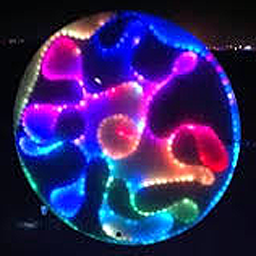#define NUM_LEDS 60
#define DATA_PIN 3
#define CLOCK_PIN 13
void setup() {
delay(2000);
}
void loop() {
for(int whiteLed = 0; whiteLed < NUM_LEDS; whiteLed = whiteLed + 1) {
delay(100);
}
}
CFastLED FastLED
Global LED strip management instance.
central include file for FastLED, defines the CFastLED class/object
void show(uint8_t scale)
Update all our controllers with the current led colors, using the passed in brightness.
static CLEDController & addLeds(CLEDController *pLed, struct CRGB *data, int nLedsOrOffset, int nLedsIfOffset=0)
Add a CLEDController instance to the world.
@ RGB
Red, Green, Blue (0012)
Representation of an RGB pixel (Red, Green, Blue)

